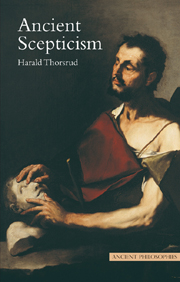Book contents
- Frontmatter
- Contents
- Preface
- Sources and abbreviations
- Chronology
- 1 Introduction
- 2 Pyrrho and Timon: the origin of Pyrrhonian Scepticism
- 3 Arcesilaus: the origin of Academic Scepticism
- 4 Carneades
- 5 Cicero: the end of the sceptical Academy
- 6 Aenesidemus: the Pyrrhonian revival
- 7 Sextus Empiricus: the consistency of Pyrrhonian Scepticism
- 8 Pyrrhonian arguments
- 9 The (ordinary) life of a Pyrrhonist
- Notes
- Guide to further reading
- References
- Index of passages
- Index
9 - The (ordinary) life of a Pyrrhonist
- Frontmatter
- Contents
- Preface
- Sources and abbreviations
- Chronology
- 1 Introduction
- 2 Pyrrho and Timon: the origin of Pyrrhonian Scepticism
- 3 Arcesilaus: the origin of Academic Scepticism
- 4 Carneades
- 5 Cicero: the end of the sceptical Academy
- 6 Aenesidemus: the Pyrrhonian revival
- 7 Sextus Empiricus: the consistency of Pyrrhonian Scepticism
- 8 Pyrrhonian arguments
- 9 The (ordinary) life of a Pyrrhonist
- Notes
- Guide to further reading
- References
- Index of passages
- Index
Summary
The most persistent objection to Pyrrhonian Scepticism is that life is not possible without beliefs. This may be applied to the practice of scepticism as well as ordinary, day-to-day activities. So while the sceptic goes shopping, makes breakfast or argues against dogmatists, she is deluded if she thinks she has no beliefs. According to the objection, all intentional, purposeful action presupposes some sort of belief.
There are two different types of response the sceptic might make, or that we might make on her behalf. First, we can deny that action presupposes belief. If so, the sceptic is able to act without holding any beliefs, and the scope of epochē may be unrestricted. Secondly, we can agree that action presupposes belief and claim that this is not a problem because the sceptic has the sort of belief necessary for the relevant action. In this case, the scope of epochē is limited: the sceptic does not suspend judgement about everything. I shall follow Gail Fine (1996) in referring to these options as the “no-belief view” and the “some-belief view” respectively.
Whether Sextus offers a no-belief view or a some-belief view remains controversial. The versatility of the concept of belief complicates the issue further by allowing for variations within each camp. One attractive hypothesis is that versions of both views appear in Sextus' work, reflecting competing strands in the history of Pyrrhonism.
- Type
- Chapter
- Information
- Ancient Scepticism , pp. 173 - 200Publisher: Acumen PublishingPrint publication year: 2008

